Have you ever searched for ways to get thicker fuller hair and felt disappointed by products that don’t deliver. I am aware of the hardship of seeing hair thinning and feeling powerless as it loses its strength and luster. That’s when I started looking into natural remedies and one solution kept coming up again and again rosemary oil hair growth. It sounded simple but could it really make a difference?
The truth is rosemary oil has become one of the most talked to about natural treatments for boosting thickness and reducing hair fall. We will examine how rosemary oil promotes hair development what the science says about it and how to utilize it for optimal effects in this blog. From before to and to after transformations to easy application tips you’ll find everything you need to finally give your hair the care it deserves.
Why Hair Thins & Falls Out
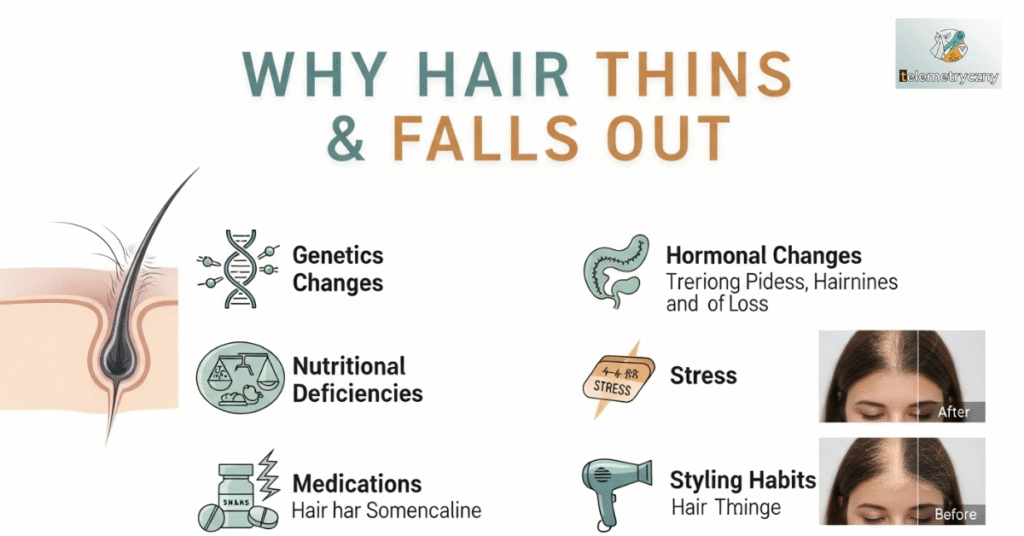
Hair loss doesn’t usually happen overnight. It’s a slow process and by the time you notice it’s often been building for months or even years. There are many reasons behind it and most of them come down to the way your body and scalp respond to stress hormones and environment.
One of the biggest culprits is genetics. If hair loss runs in your family chances are you’ll see some level of thinning as you age. Hormones especially DHT (a byproduct of testosterone) can shrink hair follicles over time making each new strand finer until it stops growing altogether.
Lifestyle also plays a role. Stress sleep deprivation and poor diet can all inhibit hair growth. Next is scalp health when follicles become clogged or circulation is weak hair just does not have the conditions it needs to grow. Commonplace practices like overheating or using harsh chemicals might make your hair more prone to breaking and shedding.
Understanding these causes matters because it explains why a natural approach like rosemary oil hair growth works for some people. Instead of forcing hair to grow rosemary creates better conditions for your scalp and follicles giving them the chance to do what they’re designed to do.
See More: Telemetryczny: The Silent Technology Powering a Smarter World
How Rosemary Oil Works
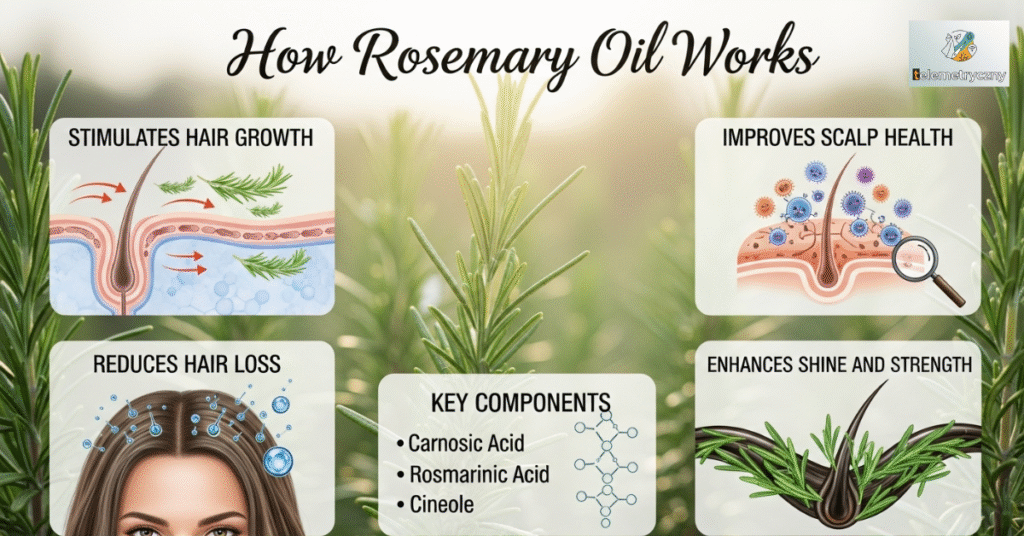
The idea of putting an essential oil on your scalp might sound too simple to make a difference but rosemary is not just another trendy ingredient. It contains compounds like carnosic acid that are believed to repair nerve endings and improve cell turnover in the scalp. That means follicles that were sluggish or weak may start working more efficiently.
Another key factor is circulation. Blood must flow continuously to the follicles for healthy hair growth. Rosemary oil has been demonstrated to improve blood flow to the scalp delivering nutrients and oxygen to the precise location where they are most required. Think of it as giving your roots a stronger support system so they can produce thicker healthier strands.
There’s also some science to back it up. A well known study contrasted minoxidil one of the most widely used medications for hair loss with rosemary oil for hair growth. After six months both groups saw similar improvements in hair count. The bonus for rosemary users. Fewer complaints about side effects like itching or irritation.
On top of that rosemary has natural antimicrobial properties. By keeping the scalp cleaner dandruff is lessened and accumulation that could suffocate follicles is avoided. Therefore even while rosemary oil won’t alter your genetic makeup it can improve the conditions on your scalp that will increase the likelihood that your hair will grow and remain healthy.
Before & After What Results Look Like

The first thing to know is that rosemary oil hair growth is not instant. Anyone promising overnight results is selling hype. Hair grows slowly on average about half an inch a month so the changes with rosemary oil come in stages.
Weeks 1 to 4: In the first month most people don’t see new growth yet. What you might notice instead is a healthier scalp less itchiness less flaking and maybe even a reduction in hair shedding. That’s the foundation being built.
Months 2 to 3: This is where before and after photos start to show a difference. Thin patches may look a little fuller and the hair you already have often feels shinier and stronger. Some people see baby hairs around the temples or hairline which is usually a good sign that follicles are waking up.
Months 4 to 6: Consistency really pays off here. Thinning areas often appear denser and ponytails can feel thicker. In one clinical trial rosemary oil users had results comparable to minoxidil after six months proving it’s not just anecdotal.
Beyond 6 months: Long term users often report their hair not only looks fuller but also breaks less and holds onto length more easily. That’s why so many before and after pictures online show dramatic transformations the difference becomes obvious with time and patience.
The key is consistency. Applying rosemary oil a few times a week and giving it several months to work is what separates real results from disappointment.
How to Use Rosemary Oil Correctly

Getting results with rosemary oil hair growth is not just about having the oil it’s about how you use it. A lot of people give up too soon because they apply it randomly or don’t stay consistent. Here’s the best way to make it part of your routine.
1. Dilute it properly
Because pure rosemary essential oil has strong qualities applying it directly to your skin may cause irritation. Use a carrier oil such as coconut or jojoba to blend a few drops. Five drops of rosemary oil should be added for every tablespoon of carrier oil.
2. Massage into the scalp
Apply the mixture to your entire scalp not just the individual hairs.Use your fingertips to massage it in for 5 to 10 minutes. This not only spreads the oil but also boosts circulation which is part of what makes rosemary effective.
3. Leave it in
Before bathing you can keep the oil on for at least half an hour even overnight if your scalp can handle it. Aim to do this 2 to 3 times per week.
4. Try it in shampoo
If oiling feels too heavy add a few drops of rosemary oil to your regular shampoo or conditioner. It’s not as concentrated but it still supports scalp health.
5. Stay consistent
Like any hair treatment it only works if you keep at it. Think months not weeks when measuring progress.
Avoid common mistakes like using too much oil it won’t speed things up or expecting results after just a few washes. Patience and consistency are what deliver the before and after changes people talk about.
See More: Best Real Estate / Construction Builders for Your Dream Home
Pros and Cons of Rosemary Oil
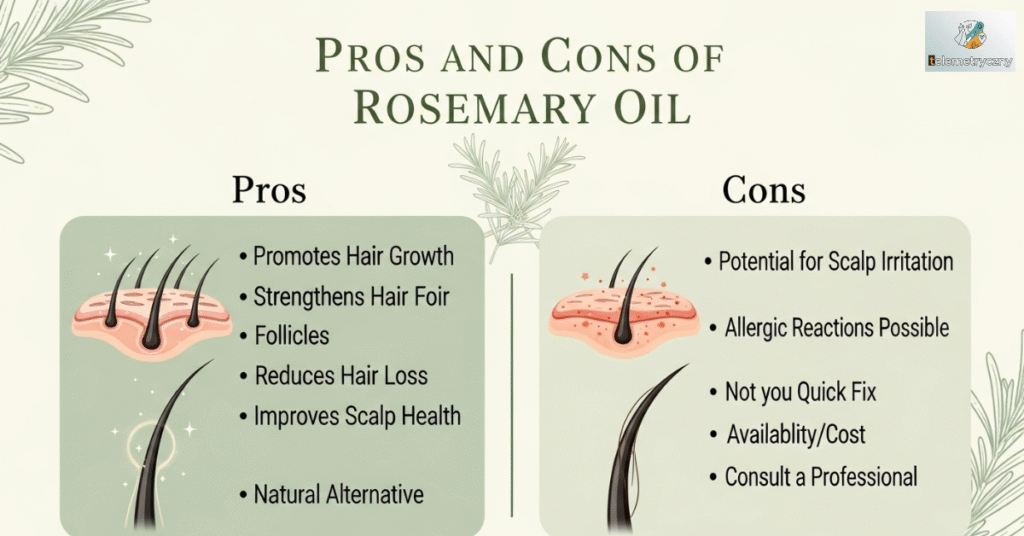
Like any remedy rosemary oil hair growth has its strengths and its limits. Knowing both helps set realistic expectations before you commit.
Pros
- Natural and affordable: Compared to medical treatments rosemary oil is inexpensive and easy to find.
- Backed by research: Studies show it can perform as well as minoxidil for some people but with fewer complaints about irritation.
- Scalp friendly benefits: Beyond growth it helps with dandruff itchiness and overall scalp health.
- Low risk of side effects: When diluted properly most people tolerate it well.
Cons
- Takes time: Visible results can take 3 6 months which requires patience and consistency.
- Not a cure to all: If hair loss is genetic or linked to certain medical conditions rosemary oil might improve thickness but won’t stop the process entirely.
- Needs proper use: Applying it straight without dilution can cause redness or discomfort.
- Varied results: Some people see dramatic changes while others notice only small improvements.
In short rosemary oil is a solid natural option if you want to improve your scalp environment and support new growth. But it’s not a miracle cure. The people who see the best before and after results are usually the ones who stick with it consistently and combine it with good overall hair care habits
Extra Tips to Boost Results

Rosemary oil can make a big difference but it works best when your overall habits support healthy hair. Think of it as part of a bigger routine not the only solution.
1. Nourish from the inside
Excessive stress might lead to hair loss. Strong follicles require vitamins like biotin and vitamin D as well as proteins like iron and zinc. Lean meats fish nuts leafy greens and eggs are simple ways to cover these bases. Hydration also matters dry hair often starts with a dehydrated body.
2. Keep stress in check
Excessive stress might lead to hair loss. Simple routines like deep breathing walking or journaling calm your system and indirectly support growth. It sounds small but people often see less shedding when their stress levels drop.
3. Be gentle with styling
Heat tools, tight ponytails and harsh chemical treatments can undo the progress of rosemary oil hair growth. Give your hair breaks from heat avoid constant pulling and choose softer accessories that don’t strain the roots.
4. Wash smart
A clean scalp is important but overwashing strips natural oils. Aim for a balanced routine wash often enough to prevent buildup but not so much that your scalp feels dry.
5. Stay consistent
The biggest tip is sticking with the routine long enough. Take monthly photos to track subtle changes you might otherwise miss. Progress often shows up slowly but side by side comparisons reveal more than the mirror does.
When rosemary oil is paired with these healthy habits before and after results usually look much more impressive.
Common Myths About Rosemary Oil
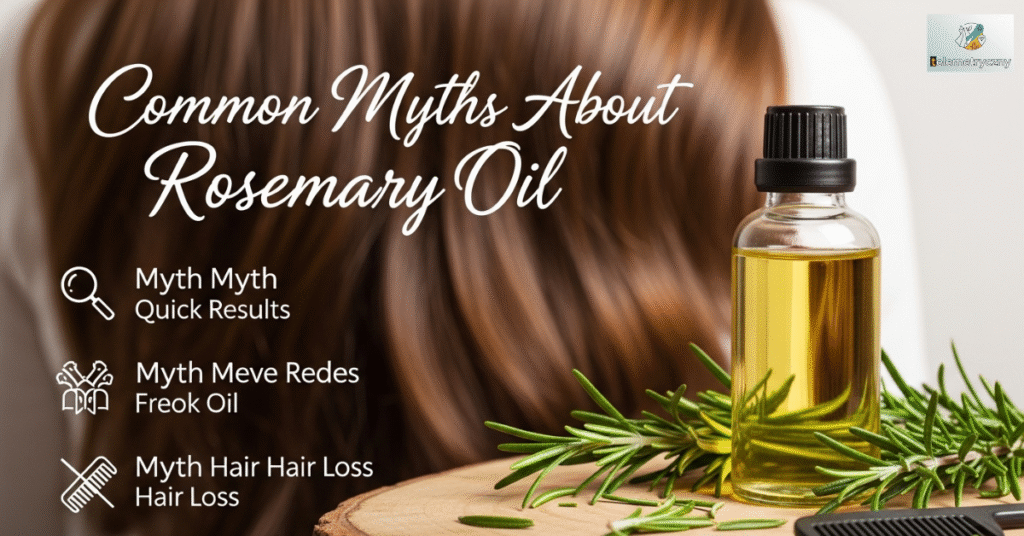
Whenever a natural remedy gains popularity myths start circulating. Rosemary oil hair growth is not an exception and it saves time and stress to separate fact from fiction.
Myth 1: It works overnight
Some people expect thicker hair within weeks but that’s not realistic.Hair grows slowly averaging around half an inch every month. Rosemary oil supports that process but it won’t speed it up dramatically.
Myth 2: More oil means faster results
Drenching your scalp in rosemary oil won’t trigger extra growth. Actually excessive use can irritate skin or block pores. A few diluted drops are enough.
Myth 3: It can regrow hair on completely bald spots
If follicles are completely inactive like in advanced baldness rosemary oil won’t bring them back. What it can do is strengthen weak or dormant follicles leading to thicker fuller coverage where hair is still present.
Myth 4: It only works for women
Hair growth struggles aren’t gender specific. Studies show rosemary oil helps both men and women especially with early signs of thinning.
Myth 5: It replaces medical treatment
While it’s a powerful natural option rosemary oil isn’t a substitute for professional care in cases of severe hair loss. Dermatologists often recommend using it alongside proven treatments not instead of them.
The truth is simple rosemary oil supports healthy growth but it’s not magic. Consistency realistic expectations and a holistic routine make the real difference.
conclusion
Although hair development takes time rosemary oil provides the necessary assistance for your scalp to function properly. By strengthening weak follicles and increasing circulation it provides a natural route to thicker fuller hair. Despite the fact that it won’t produce miracles right away consistent use frequently produces tangible outcomes.
Patience and perseverance are crucial. Use it consistently combine it with wholesome routines and monitor your development month after month. Many people who used to feel hopeless about their thinning hair now post motivational before and after pictures because of rosemary oil.
FAQs
1. Does rosemary oil really encourage the development of hair?
Rosemary oil has been demonstrated to promote the growth of stronger thicker hair and increase scalp circulation. Many find it to be just as effective as popular medications like minoxidil.
2. What is the duration required for the production of hair from rosemary oil?
Most consumers report that after two to three months of regular use their hair thickness and loss have significantly improved. For optimal outcomes apply frequently and exercise patience.
3. Is it safe to use rosemary oil on my scalp directly?
Pure rosemary oil’s potent strength might cause skin irritation. Diluting it with a carrier oil such coconut oil or adding a few drops to shampoo or conditioner is the simplest method to utilize it.
4. How frequently is rosemary oil recommended for hair growth?
Applying it 2 to 3 times a week is usually enough. If you’re using a lighter serum or pre to diluted oil it can be applied more frequently depending on your scalp’s tolerance.
Hi,
I’m Tehreem, a content writer specializing in SEO-optimized articles that rank and engage. Whether it’s AI-assisted or fully human-written content, I deliver clear, creative, and results-driven writing.

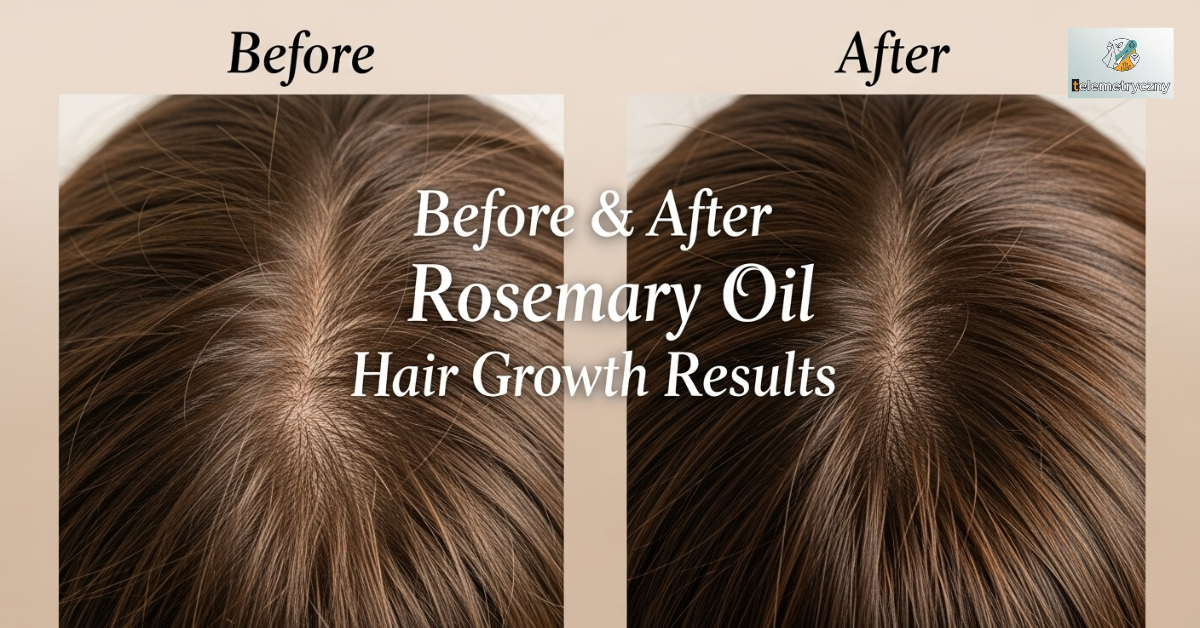
2 thoughts on “Before & After Rosemary Oil Hair Growth Results”